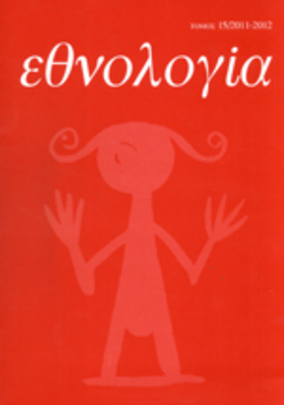Περί της Βιτόρας ή του στοιχειού του σπιτιού : η συμβολική συγκρότηση της οικογένειας και της συγγένειας στους Αρβανίτες της Αττικής
Part of : Εθνολογία : περιοδική έκδοση της Ελληνικής Εταιρείας Εθνολογίας ; Vol.2, No.1, 1993, pages 129-153
Issue:
Pages:
129-153
Parallel Title:
"Vitora" or the "spirit of the house : the symbolic construction of family and kinship among the Arvanites of the prefecture of Attica
Author:
Abstract:
The first part of the article introduces the reader to the cultural and socioeconomic life of the Arvanites of the Prefecture of Attica. An analysis of family and kinship, both being very strongly bilateral, is included in the introduction.The Arvanite inhabitants of Attica were, until recently, bilingual, speaking both Greek and Arvanite. The latter, being a mixture of Greek and an off-shoot of Tosk-Albanian, which, since their emigration to Attica during the 14th century, has followed an evolutionary direction quite independent of that of Albanian.The Arvanites of Attica together with the Greeks of Kozani (Western Macedonia) and those who are descendants of the Greeks of Pontus (a region in Northeastern Asia Minor, present-day Turkey), are the only ones who believe in a female spirit protecting the house and the family.This female spirit is known to them, to the Arvanites that is, as «Vitora». The name Vitora which is a combination of two words, the Latin vit, vet and the two Greek words efos-year and hora-hour, means «the old female spirit».This female spirit is believed to possess the «gouri», the good fortune of the inhabitants of the house.It should be noted that «Vitora» can appear either as a bird or as a female snake, nown as the «gjarpëri e shtëpisë», «the snake of the house», the «οικουρός όφις» (ikourós ófis) of the ancient Greeks.Vitora is also applied to the hardworking and able women of the house as in the case e.g. of a grandmother or a daughter who inherits the best fields, as a compensation for looking after her parents, grandparents and elderly relatives, after her marriage.The next topic of this article is centred on the term «giri», a term applied to bilateral kinship or kindred nowadays, although, in the past, it applied only to the relatives on the mother’s side as the word itself signifies, g/-«=breast, plural giri/giri=milk relatives.Certain customs associated with the important position of elderly women especially grandmothers in Arvanite society and their connection with the female spirit Vitora are furthermore discussed.The first loaf of bread which is baked in the family oven, is always offered, as a gesture of honour, to the grandmother of the family.During the first week of Lent dry fruit is offered by married daughters and daughters-in-law to their elderly mothers and mothers-in-law respectively. A comparison with similar beliefs and customs of ancient Greece and present- day Albania is also examined in the article.Conclusions as to the above related customs and symbols with the bilateral family structure and the Arvanite kinship together with the internal stratification of the Arvanite clans, their past hereditary chiefs, owing to the inequality of land distribution forms the last part of the article
Subject:
Subject (LC):
Notes:
Η εργασία αυτή αποτελεί επεξεργασμένη και διευρυμένη μορφή σύντομης ανακοίνωσης που έγινε στο Δ' Συμπόσιο Ιστορίας και Λαογραφίας Αττικής (Ανω Λιόσια 11-15 Σεπτεμβρίου 1991).




